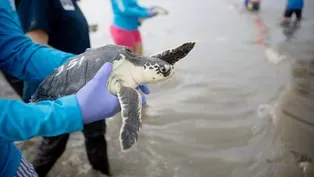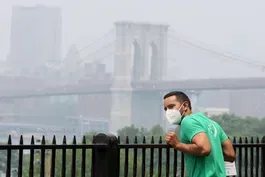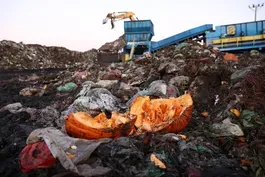
Why more Americans are dipping into retirement funds early
Clip: 4/6/2024 | 8m 16sVideo has Closed Captions
Why more Americans are making hardship withdrawals from retirement accounts
For a growing number of Americans, retirement accounts are doing double duty as savings accounts for the future and emergency funds for the here and now. Vanguard Group says that 2023 saw early withdrawals from a record 3.6 percent of the 5 million accounts it administers, up from 2.8 percent in 2022. Roben Farzad, host of NPR’s "Full Disclosure" podcast, joins John Yang to discuss.
Problems with Closed Captions? Closed Captioning Feedback
Problems with Closed Captions? Closed Captioning Feedback
Major corporate funding for the PBS News Hour is provided by BDO, BNSF, Consumer Cellular, American Cruise Lines, and Raymond James. Funding for the PBS NewsHour Weekend is provided by...

Why more Americans are dipping into retirement funds early
Clip: 4/6/2024 | 8m 16sVideo has Closed Captions
For a growing number of Americans, retirement accounts are doing double duty as savings accounts for the future and emergency funds for the here and now. Vanguard Group says that 2023 saw early withdrawals from a record 3.6 percent of the 5 million accounts it administers, up from 2.8 percent in 2022. Roben Farzad, host of NPR’s "Full Disclosure" podcast, joins John Yang to discuss.
Problems with Closed Captions? Closed Captioning Feedback
How to Watch PBS News Hour
PBS News Hour is available to stream on pbs.org and the free PBS App, available on iPhone, Apple TV, Android TV, Android smartphones, Amazon Fire TV, Amazon Fire Tablet, Roku, Samsung Smart TV, and Vizio.
Providing Support for PBS.org
Learn Moreabout PBS online sponsorshipJOHN YANG: For a growing number of Americans, retirement accounts are doing double duty savings for the future when they're no longer working and as a source for emergency funds for the here and now when they feel a cash crunch.
In many ways, it's a reflection of the dueling forces in the US economy.
A strong stock market is growing retirement accounts, while stubborn inflation is keeping prices high for everything from groceries to gasoline.
We asked viewers who've tapped into their retirement accounts to tell us why they did it.
HANNAH EMPIE: My name is Hannah Empey.
I am currently unemployed, and I live in Pennsylvania.
The second that the meeting was over with HR and my former boss, I went to withdraw my entire 403(b) account.
I was able to make that withdrawal and had the money in three days.
And it was a lifesaver for me because it would take three months for my unemployment to get approved.
JIM SITRICK: I'm Jim Sitrick.
I've lived in Maine, where I am now for about almost three years.
Eight months ago, I began suffering from some medical difficulties, some situations that led me to start missing more work than I would like and ended up with me being hospitalized for several weeks as a consequence of having no income and needing to continue with our health insurance that I needed to then pay for out of pocket.
I had to dip into the savings I had in my thrift savings plan.
AMY STRIVERS: I'm Amy Stivers.
I live in Colorado.
In 36 months, I had to, let's see, a nice word they like to use is pivot.
I had to pivot my plans and go from retiring early modestly, just trying to be well for the rest of my life to I have to spend everything for the new housing price.
The price of these homes, a 20 percent deposit, six figures cash you got to come up with.
So that was a lot of savings I had in my 401K.
Then I cashed it out in order to get into the house.
HANNAH EMPIE: You know, times are hard right now, so I don't feel any shame in what I had to do to make ends meet.
JIM SITRICK: I really did consider what alternatives there would be to taking money out of my thrift savings plan.
And the only one that I was not either embarrassed about or unwilling to do was take out money that I had saved myself.
AMY STRIVERS: The nest deck is for later, but it's like, oh no, we're using it now in our mid-50's instead of in her 70s HANNAH EMPIE: I was raised by my grandparents, and I've seen what retirement looks like when there isn't a fallback plan, when it's just Social Security.
JIM SITRICK: I most likely will not be able to retire, period.
That I will continue to work until I am no longer physically capable of doing so.
JOHN YANG: The investment for Vanguard Group says last year there were early withdrawals from a record 3.6 percent of the 5 million retirement accounts and administers.
That's up from 2.8 percent in 2022 and above the pre pandemic average of about 2 percent.
Roben Farzad is host of the public radio podcast Full Disclosure.
Roben, what's going on here?
Is this unusual, this amount of early withdrawals?
ROBEN FARZAD, Host, "Full Disclosure": Isn't it so unusual in that we have such low unemployment, again touched near something a 50 year low.
You have housing prices at a record high.
You have a stock market like you mentioned, near a record high.
And yet capital I inflation really walloped us coming out of the pandemic.
And you've seen your purchasing power and your cost of living, all of this calamitous stuff happen while the nightly news is telling you that the economy is great.
So you want to tap what's working, but you're not necessarily thinking about your reality when you're 75 or increasingly 80 years old.
JOHN YANG: But when people look at their 401k statements with the stock market rising, are they thinking, well, geez, I can take some money out.
It won't hurt.
ROBEN FARZAD: It won't hurt.
But then again, you think about how $1,000 compounds over a lifetime, if you're one of these people who are fortunate and impressionate enough to do it in your 20s, you're talking potentially millions and millions of dollars at retirement.
It's very hard to instruct a 20-year-old or even a 30-year-old or a 50-year-old that look, you can't just depend on Social Security, you can't just depend on Medicare.
That's a very hard discipline to teach people who are instructed to deal with the here and now.
Nobody lives in the long term.
It's easy for economists and people to be in theoretical in the long term.
But it also breaks my heart to see a 20 or 30 something have to rate at NASDAQ.
JOHN YANG: What other consequences are there of tapping into a retirement fund this way in terms of taxes and other things?
ROBEN FARZAD: Yeah, you do have at the discretion of Uncle Sam, you could apply for a hardship withdrawal where you don't have the penalty.
You still have to pay taxes on the appreciation.
But again, $1,000 put in a retirement account.
If you're looking at it like, wow, I have $10,000 that's found money that I didn't even realize I had that could tide me over for several months.
Well, $10,000 could well at long term market rates be hundreds of thousands of dollars or millions of dollars.
So how many people are having that dialogue with their God willing retired selves?
And that's what keeps me up at night.
JOHN YANG: So we heard in that tape, we heard people saying that they took money out because they had lost jobs, they had medical emergencies.
For people who are in those positions, find themselves in those situations, what should they be thinking about as they consider how to raise the cash they need?
ROBEN FARZAD: Are you willing to downshift your life?
Are you willing to maybe hold off on buying?
The American dream has been deferred.
You know, 50 some odd year old woman you interviewed saying that we wanted that house, we definitely wanted that house.
They're out there using appreciated stock market assets to buy really appreciated housing assets.
Who's to say that housing market's not going to fall in a few years and they'll have buyer's remorse or they'll need that equity value if there's an injury or an illness into their sixties or seventies.
But I think for many, and this sounds cliche, that is part of the American dream.
And if that's broken, they're thinking, if not now, then when?
JOHN YANG: What are the alternatives to tapping into a retirement account?
And where should tapping into the retirement account rank in those alternatives?
ROBEN FARZAD: I would put it as a last case thing.
No one wants to bring up avocado toast or your car or the number of Ubers you take.
But again, this is structured 401Ks and 403Bs.
So it's an absolute last resort.
It's also why we haven't seen the privatization of Social Security.
If everybody was just free to raid a private Social Security account, can you imagine how many people would be in arrears later in life?
So that's very hard, again to say, cut back, right size your standard of living, take on temp jobs, gig.
It's like me saying, stay in school, drink your milk.
It sounds very paternalistic.
But the numbers again, bear out that you want to hold on, that you want to have this prescience, this ability to look into the future and take care of yourself, where we know that the social safety net has failed so many people in retirement, in their elderly years.
JOHN YANG: You heard some of those people in the tape talk about they lost their job, they had a medical problem that kept them off the job.
They weren't buying fancy homes, they needed cash.
What would you say to them?
ROBEN FARZAD: What is your cash runway?
I mean, were you in a structure that you were saving enough cash for an emergency?
We know the numbers with Americans who don't even have 1000 in the checking account or the savings account for a medical emergency.
So you are day to day.
You are paycheck to paycheck.
There are alternatives for you to maybe ahead of this to consider, if you can right size your cost of living, your expenses of living, how much money you're saving.
I mean you're actually making something on your savings right now, where in the past it would have just been inflated away.
But so many Americans look at saving money as a luxury for other people, when in reality saving and investing, they have to be fundamental pillars of personal finance.
JOHN YANG: Roben Farzad, host of the public radio podcast Full Disclosure.
Thank you very much.
ROBEN FARZAD: My pleasure, John.
Endangered sea turtles released off the coast of Georgia
Video has Closed Captions
Dozens of endangered sea turtles released off the coast of Georgia (1m 16s)
How worsening global air quality puts human health at risk
Video has Closed Captions
Why air quality is getting worse in many places and how it puts human health at risk (5m 30s)
Why food waste is a global problem and what can be done
Video has Closed Captions
Food waste is a global problem. Here are major drivers and what can be done about it (5m 48s)
Providing Support for PBS.org
Learn Moreabout PBS online sponsorshipSupport for PBS provided by:
Major corporate funding for the PBS News Hour is provided by BDO, BNSF, Consumer Cellular, American Cruise Lines, and Raymond James. Funding for the PBS NewsHour Weekend is provided by...














